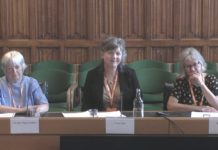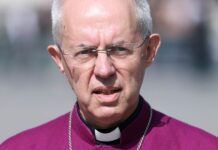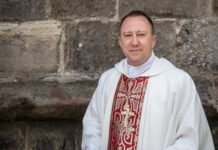Charged with developing proposals to help move The Episcopal Church forward with racial healing and becoming Beloved Community, the Presiding Officers’ Working Group on Truth-Telling, Reckoning, and Healing has released a report that proposes the creation of a new organization within The Episcopal Church called the Episcopal Coalition for Racial Equity and Justice.
The proposed coalition would be “a voluntary association of Episcopal dioceses, parishes, organizations, and individuals dedicated to the work of becoming beloved community,” the report states. It would be governed by a board appointed by the presiding bishop and president of the House of Deputies, made up of a majority of people of color, and funded on an ongoing basis from a tithe of Domestic and Foreign Missionary Society (DFMS) financial holdings, at approximately $2 million annually.
“The coalition is a vehicle to affirm and coordinate so much good work already happening throughout the church,” said the Rev. Canon John Kitagawa of the Episcopal Diocese of Arizona, a co-convener of the working group. “It will help the church to begin much-needed structural and cultural changes in our quest to build the Beloved Community.”
A resolution to create the coalition will be considered by the General Convention at the church’s 80th General Convention in July.
The report also includes six additional General Convention resolutions. These resolutions call for a forensic audit of DFMS assets to identify those tied to racial injustices; a comprehensive review of the Book of Common Prayer, 1982 hymnal, and other liturgical materials to identify “colonialist, racist and white supremacist, imperialistic and white nationalist language and content;” an investigation into the church’s operation of Indigenous boarding schools; the development of best practices in hiring and workplace equity; and guidelines for language to describe people of color in the church.
The working group also offered 92 recommendations, most of which would be “moved forward and amplified” by the new coalition. Those include ways to cultivate truth-telling, reckoning, and healing at each level of the church. Suggestions range from “research and share the full history of historically Black churches within your diocese” to “commission artists, poets, liturgists, and musicians of color to create new hymnody, prayers, and liturgies.” The recommendations include training and learning opportunities for children and adults and contain multiple links to dioceses that are already working to facilitate truth-telling, reckoning, and healing.
The working group was composed of 14 clergy and lay members of Executive Council, the Executive Council Committee on Anti-Racism and Reconciliation, and the Presiding Officers’ Advisory Group on Becoming Beloved Community Implementation appointed by Presiding Bishop Michael Curry and House of Deputies President Gay Clark Jennings. It first convened in September and met monthly to address the mandate given by the presiding officers in their June addresses to Executive Council.
“We have an opportunity to engage in a churchwide process of truth and reconciliation that, to my knowledge, has not been done before on that level,” Curry said then. “This is an invitation to do the hard and holy work of love. We have an opportunity to be a witness to how we can overcome our divisions and heal our hurts.”
“The challenge of the presiding officers’ charge inspired and energized the working group to offer a report that honors the work already happening across the church and recommends a bold course of action that will continue to place the work of racial reckoning, justice and healing at the center of the life and mission of the church for generations to come,” said the Rt. Rev. Samuel Rodman, bishop of the Episcopal Diocese of North Carolina, and a co-convener of the group.
The working group spent time listening, reflecting, praying, and talking with people involved in truth, healing, and reconciliation work. Its members looked for “common elements and themes, challenges or roadblocks,” acknowledging the need to deal with the legacies of colonialism and imperialism in the church and the urgency of reckoning with generational racial trauma created at times when the church was “directly the source of suffering and oppression.”
“The working group shows what can happen when laypeople, clergy and bishops come together to share experiences and perspectives, listen for the Holy Spirit’s guidance, and debate how the church should participate in God’s mission,” Jennings said. “I am extraordinarily grateful to the faithful people who persevered, even as the pandemic raged around us, to complete this work in time for the 80th General Convention.”
“We had disagreements but never an argument,” Kitagawa said. “Mutual respect, focus on the mission, and commitment to racial equity and justice sustained us and helped us to do deep work in a very short period of time.
“Baby Boomers will remember Peter, Paul and Mary singing, ‘If I had a hammer, I’d hammer at justice,’” he said. “The report, resolutions and recommendations offer the church the opportunity to hammer at justice.”
Members of the working group welcome questions and comments about the report and are open to meeting online with deputations or other groups in the church. Email info@becomingbelovedcommunity.org for more information.



